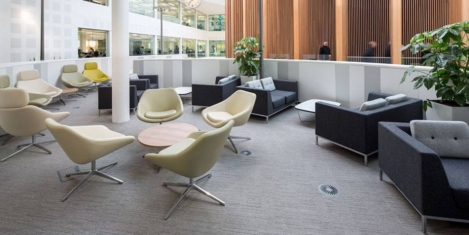October 20, 2016
Herman Miller launches new Aeron Chair 0
 Office furniture giant Herman Miller has today unveiled a new Aeron chair. The Aeron is now the world’s bestselling chair of all time, but when it was first launched in 1994, it was unlike any chair the world had ever seen. Instead of a padded seat and back, designers Bill Stumpf and Don Chadwick did away with foam and fabric to create a ‘machine for sitting’. Although Herman Miller later confessed that they had misgivings that the chair’s radical design would lead to its rejection in the market, instead Aeron quickly became the most recognisable performance chair in history, with over 7 million sold in 134 countries and a staple in popular culture. Herman Miller’s new Aeron retains the distinctive silhouette of the iconic chair, but every component of the design has been updated to raise the bar for performance seating, according to the firm. With the input of original co-designer Don Chadwick, and a team of scientists, engineers, materials specialists, and researchers who worked on the project for over two years, Herman Miller claims to have enhanced the chair by combining the latest insights in anthropometrics and ergonomics with two decades of advancement in materials, manufacturing, and technology.
Office furniture giant Herman Miller has today unveiled a new Aeron chair. The Aeron is now the world’s bestselling chair of all time, but when it was first launched in 1994, it was unlike any chair the world had ever seen. Instead of a padded seat and back, designers Bill Stumpf and Don Chadwick did away with foam and fabric to create a ‘machine for sitting’. Although Herman Miller later confessed that they had misgivings that the chair’s radical design would lead to its rejection in the market, instead Aeron quickly became the most recognisable performance chair in history, with over 7 million sold in 134 countries and a staple in popular culture. Herman Miller’s new Aeron retains the distinctive silhouette of the iconic chair, but every component of the design has been updated to raise the bar for performance seating, according to the firm. With the input of original co-designer Don Chadwick, and a team of scientists, engineers, materials specialists, and researchers who worked on the project for over two years, Herman Miller claims to have enhanced the chair by combining the latest insights in anthropometrics and ergonomics with two decades of advancement in materials, manufacturing, and technology.


































October 19, 2016
Where are zero hours contracts and the gig economy taking us? 0
by Mike James • Comment, Flexible working
(more…)